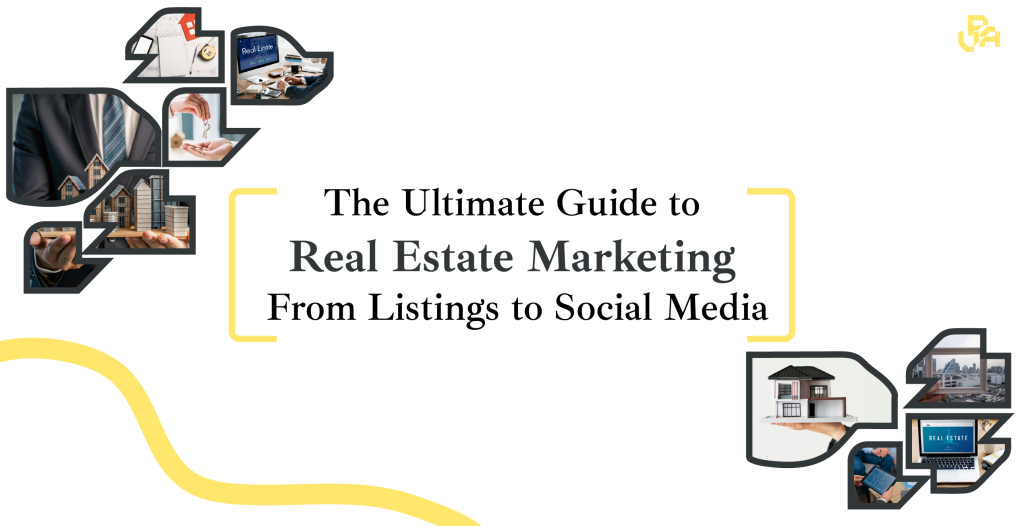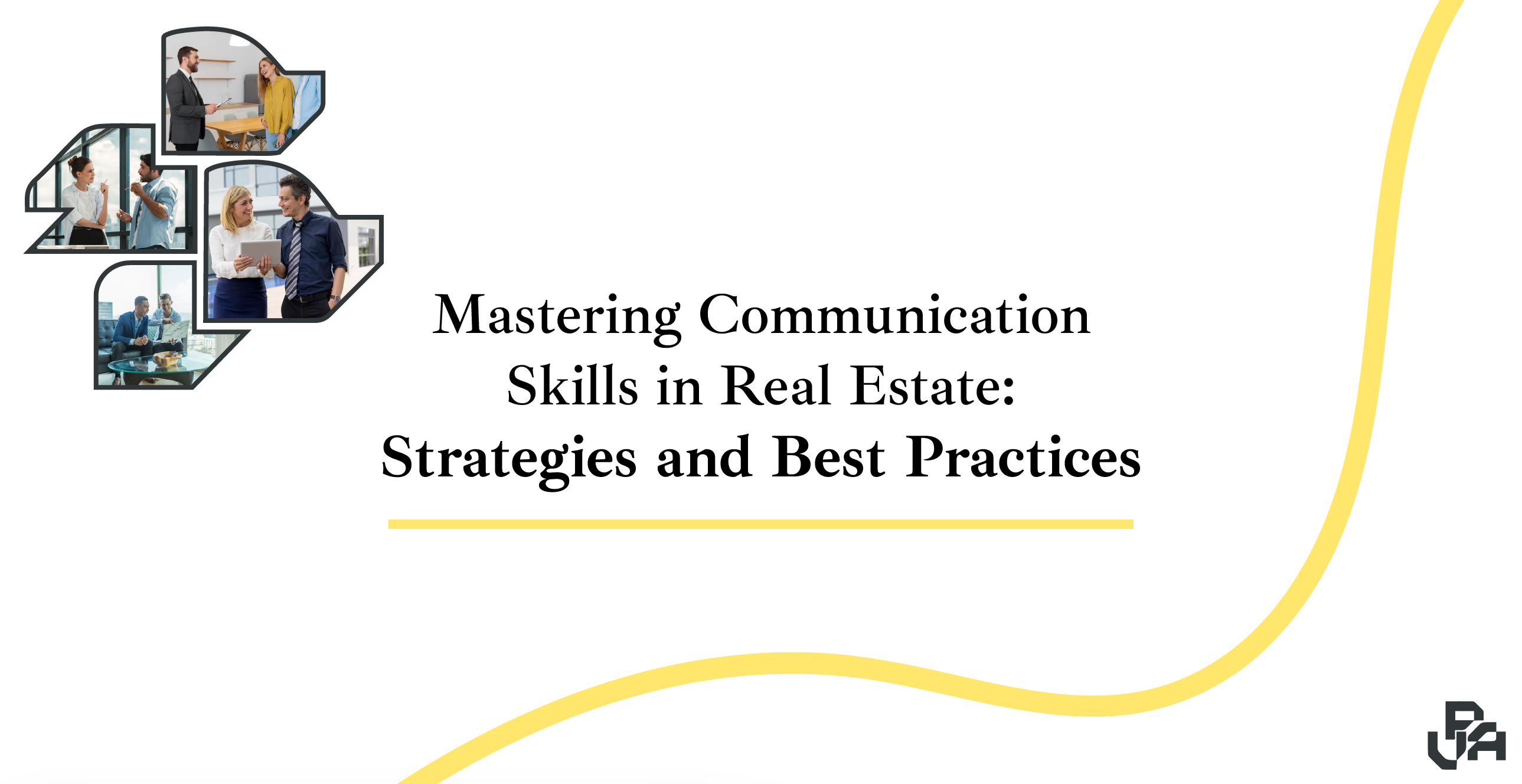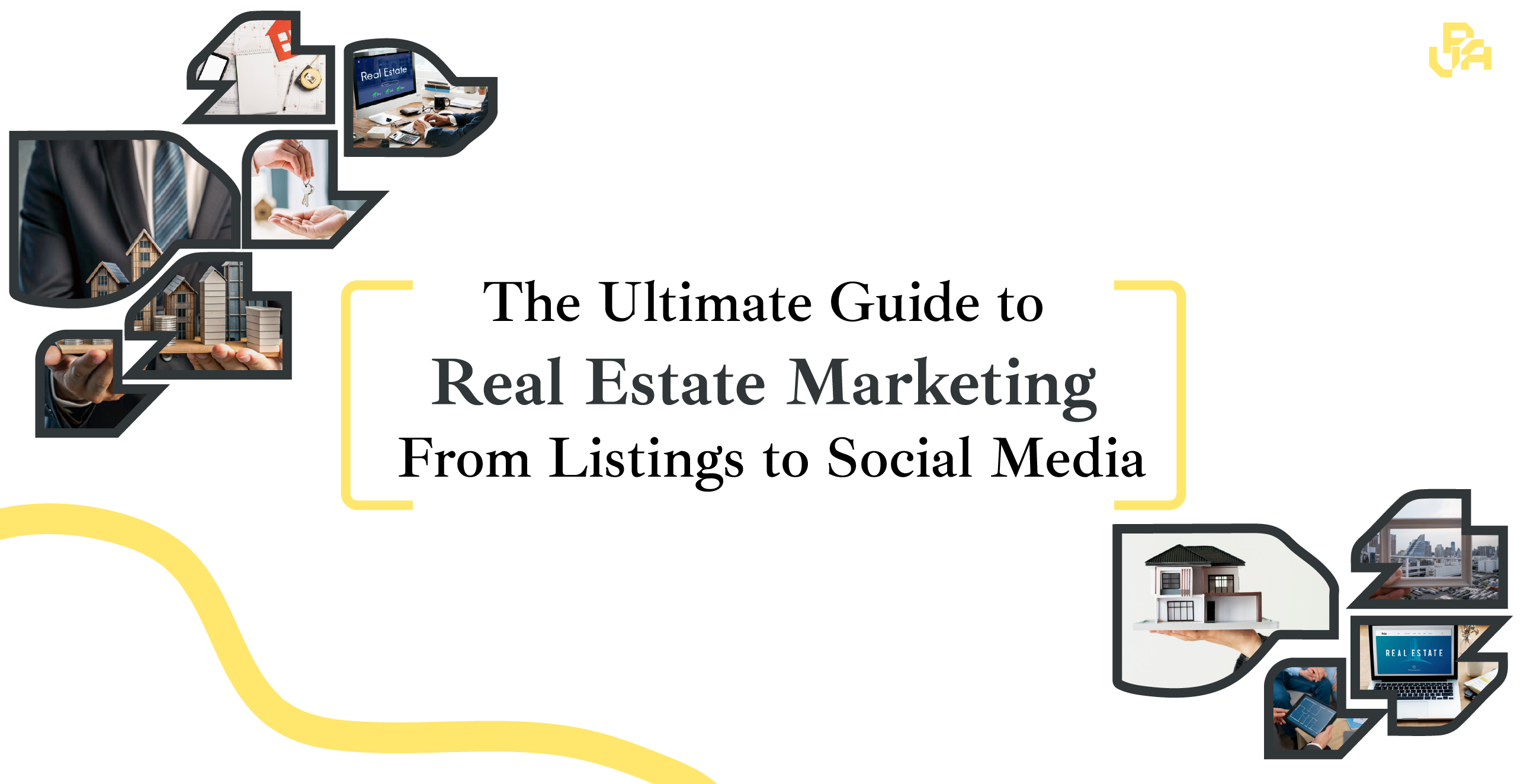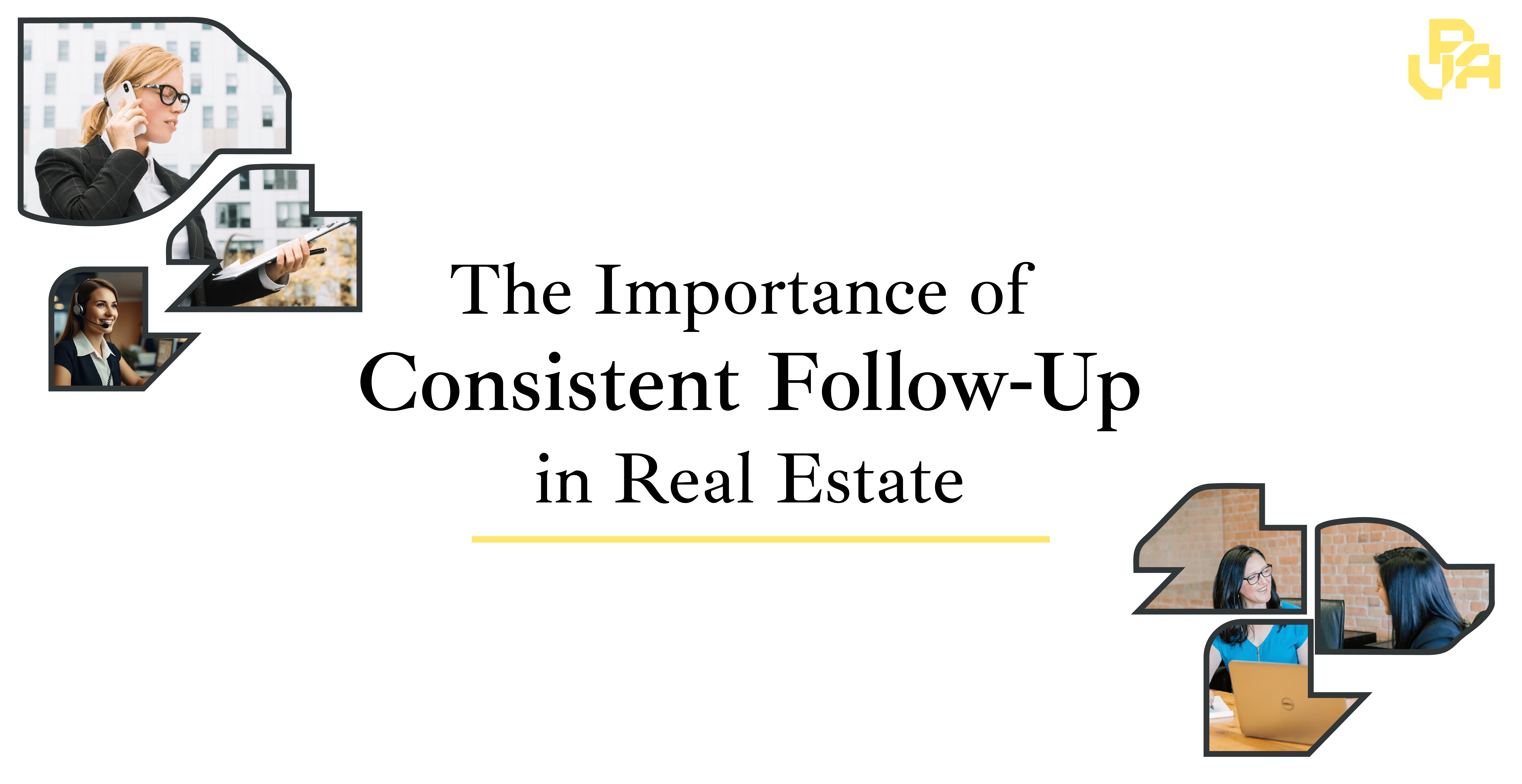Real estate marketing has become an indispensable tool for realtors, brokers, and real estate agencies. It helps them promote property listings, attract leads, and construct a strong brand that endures. It also assists agents in building relationships with prospective clients, continuing to nurture relationships with current ones, and expanding their circle of professional contacts within the industry.
When it comes to real estate marketing, the key is to figure out how to make yourself stand out and grab the attention of potential customers. That’s how you can get great results from your digital marketing efforts.. The following guide will outline how real estate agents, brokerages, and firms can make better use of social media.
When we talk about marketing, there is no escape from mentioning social media. It becomes with time the backbone of any advertising. Keep on reading to discover everything you need to know about promoting your listings and the benefits that will affect your real estate business.
Advantages of Social Media for Your Real Estate Business
Real estate is a hypercompetitive industry, and for one to be in business, they have to be a step ahead. It’s quite relevant in a situation where 90% of agents advertising their properties do so online, according to the National Association for Realtors.
One main purpose for agencies doing social media marketing is to build an online brand presence for their real estate business. Following are some of the advantages of using social media in real estate:
1. Generates Higher Visibility
If you want more visibility for your listings and aiming for more visitors to come through your available houses, social media helps you turn views into sales more effectively than nearly any other tool.
In addition to connecting you with thousands of potential clients, it also keeps you top-of-mind with past clients, reminding them of why they chose you-and why they should again whenever they are in search of a property.
2. Creates Greater Reach and Improves Lead Generation
Where an online listing may receive a couple of dozen views, a well-managed social media account could reach thousands of potential buyers. Admittedly, these may be superficial metrics in terms of vanity, but one should not look past the value of engagement this could bring to your real estate brand.
Social media also qualifies as one of the most effective leads generators. As much as word-of-mouth referrals mean a great deal, social media also has the added advantage of letting potential clients find you through hashtags, collaborative posts, or organic searches to unlock new ways to gain clients.
3. Opens More Networking opportunities
While real estate at times can feel like a solo sport, remember: so much of brand building is in networking. Social media makes it much easier to do this with other agents, brokers, and firms. Do not be afraid to partner with active professionals in the online community; strategic partnerships will help your organic reach go a long way.
4. Optimizes Targeted Advertising
Whether trying to find high net worth clients or first time home buyers, social media advertising allows targeting according to specific demographics, location, and interests. So, the right message to right people can be imparted without wasting resources on the people who may not belong to that specific market niche.
5. Provides a Cost-Effective Marketing Tool
Organic social media marketing is one of the cheapest ways to get in contact with your ideal or potential prospects to market your real estate business. While some paid promotions are involved, most of the platforms are free, making low-budget access possible.
Now that you have read about the general social media advertising benefits for your real estate business, myVPA will take you step-by-step through the process of building an online presence for your real estate business.
Two Key Social Media Aspects For Every Real Estate Marketing Strategy
Defining Your Brand Personality
Before delving into social media, you really need to determine what your brand personality is. Is your brand professional and commanding, or friendly and approachable? Knowing this will be super helpful in sending out a continuing message that will attract the right audience.
Now, reflect on what values define your brand. Incorporate them into a social media strategy. Whether your brand is centered around transparency, innovation, or customer-centricity, determining core values sparks content bound to resonate with your audience on deeper levels.
Maintaining Consistency in Brand Imaging Across All Platforms
Consistency is the backbone of building your brand. Your brand image log has to be consistent across all social media platforms with color schemes and tone of voice. This will further help strengthen brand recognition and raise the decibel level of your voice.
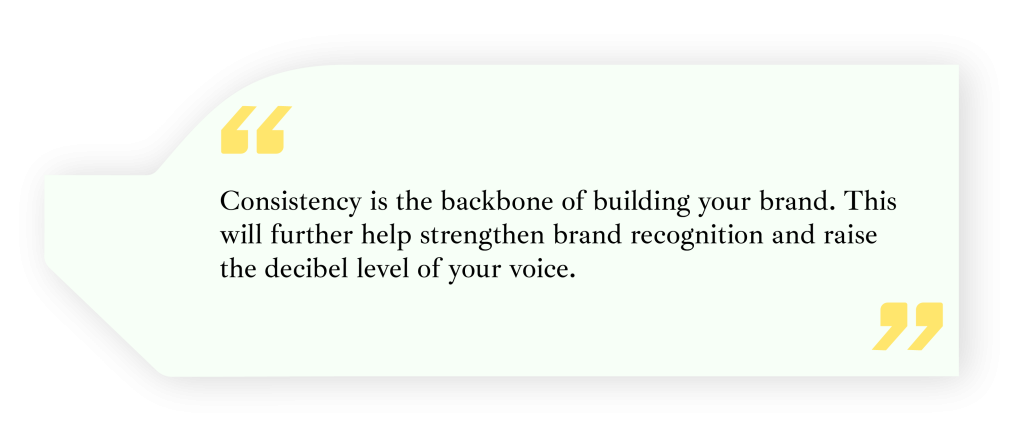
Consistency will be key in the style of your content and posting frequency, as well as audience engagement. This simply means you are consistent with strong branding that will surely create a niche for brand loyalty and follower trust.
In order for you to implement the above points, make sure to follow the upcoming tips for a great real estate marketing that other companies can look up for.
Essential Social Media Tips for Effective Real Estate Marketing
Ready to get started? Following are some tips to help you develop an effective social media strategy for your real estate business:
1. Plan Early
What separates great accounts from their competition is a clear social media strategy. You can’t just make up clever posts on the spur of the moment; you need to have a long-term plan that will grow your following in a consistent manner.
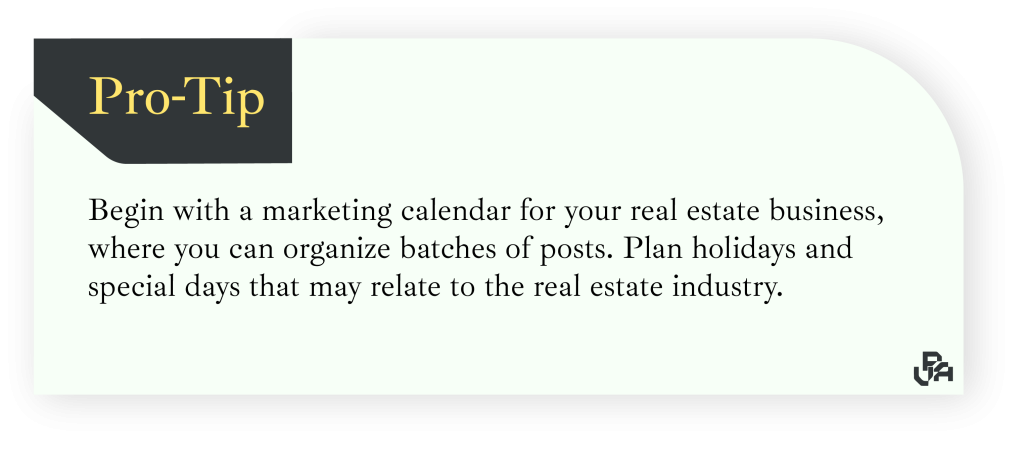
Use Hootsuite and other tools to plan, batch, and schedule content in advance. This will help you ensure that your audience is always seeing new content about which to interact.
2. Identify The Audience You Would Like to Target
Before you start setting a strategy, know who your target audience is. Then identify what they are looking for. Are you targeting first-time homebuyers in a specific area? Or do you run a luxury real estate firm looking for high-net-worth buyers?
It is your target audience that will direct your social media channel choices, and further streamline your general strategy. More senior clients are going to get in touch with you on Facebook. While younger influencers and interesting fact providers will be doing so through YouTube, TikTok, and Instagram.
3. Personalize Your Brand
Branding is everything in real estate, and relationships between clients and agents are founded upon one thing: trust. However, your brand is so much more than merely your logo, fonts, or colors. It is an experience that leads your clients into your world.
Consider what kind of perception you want to put across to prospective and current clients alike. If it’s a high-end, luxury firm, then travel, high-end vehicles, and high-brow dining can be posted. Want to attract first-time homebuyers? Maybe you share personal milestones of engagement, buying a home, and family events.
But above all else, stay true to your values and show that online. Authenticity is something clients connect with on such a deep level; it increases their connection with your brand.
4. Develop Amazing Visuals
The real estate industry is a world of visual appeal. Let your audience see the brilliance of your property listings through quality, visually striking images that will hypnotize buyers.
Create eye-catching content on your social media platforms, including property walkthroughs videos and photos taken from different angles. Consider, adding virtual home tours. They are also one of the best means to let buyers take an in-depth view of each property.
Video-centric platforms like TikTok, Instagram Reels, and YouTube, are becoming on top of people’s minds.
Check out this real estate social media post by RE/MAX Canada. It might help you get a spark in creating your content visually and verbally.
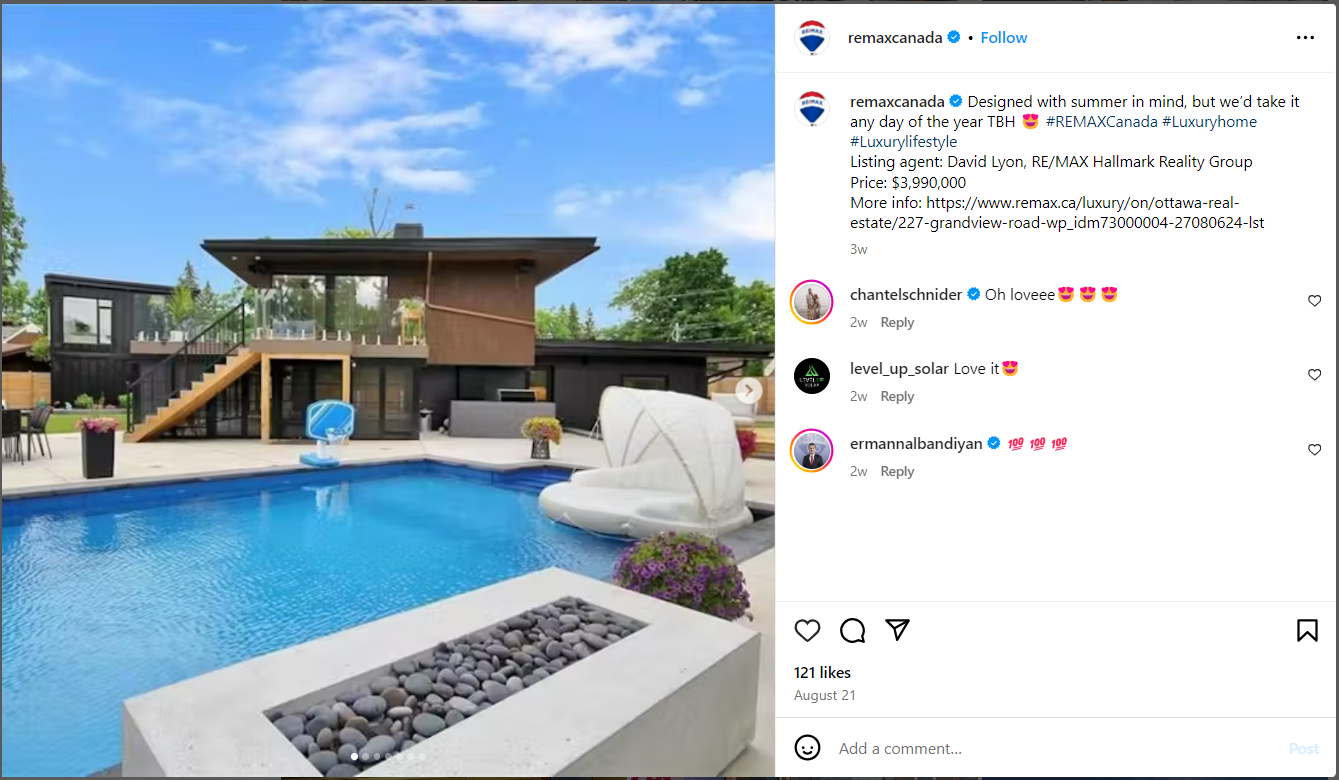
5. Highlight The Neighborhoods Rather Than The Property
Even though it is important that the listings be featured. Overloading the audience with a continuous stream of property postings will only lead to disengagement.
The National Association of Realtors reports that 46% of buyers want to receive insights about their search areas from their real estate agent.
Mix it up with local events, places to hang out, new restaurants in town, festivals, museums, and sporting activities. Therefore, This will surely drive more engagement from your followers, developing a better rapport with them.
6. Get on Board the New Technology
Social media in real estate keeps evolving. Think TikTok and YouTube. Be ahead of the pack by being an early adapter to new tools and trends.
Therefore, you don’t need to jump into each and every emerging trend, but taking the time to learn about a host of new social media tools will pay off in competitive advantage.
7. Focus on Customer Service and Set It Priority
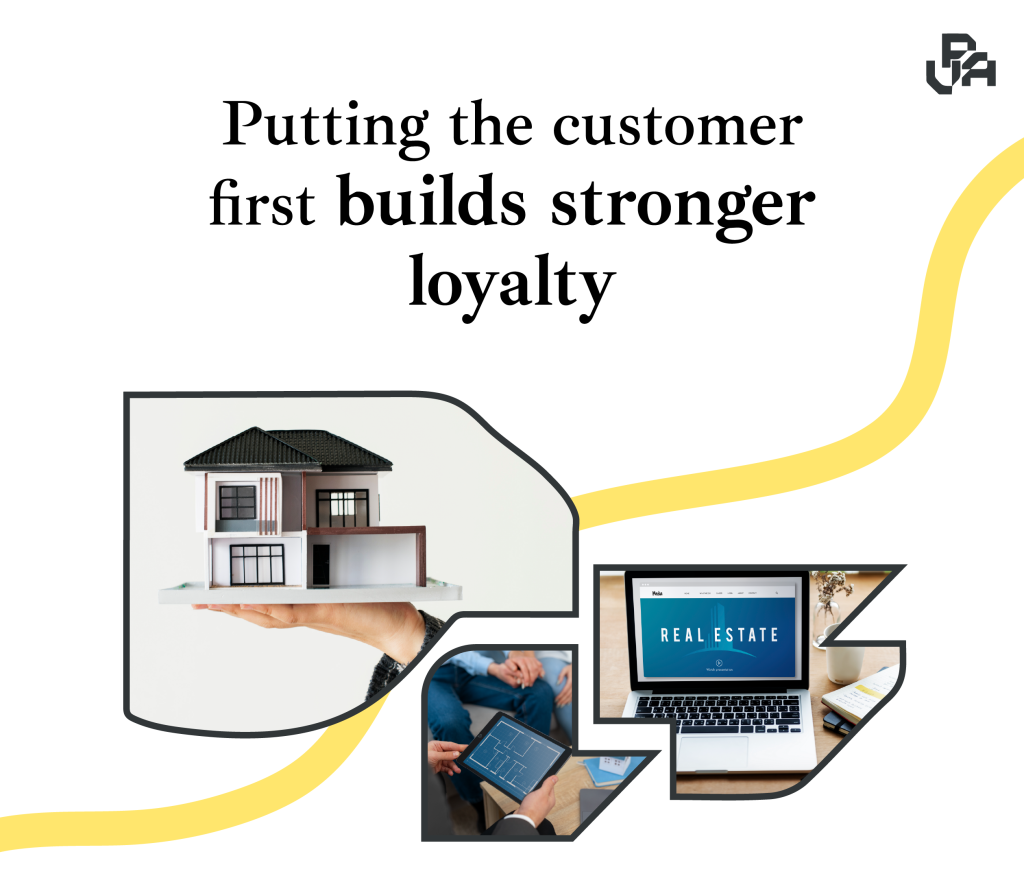
Social media for real estate is all about the relationships themselves. Make sure to respond quickly and with politeness to comments and messages of every variety–good, bad, or indifferent. It will help you go a long way in establishing trust and much deeper relationships with your target audience.
Address a concern as soon as possible when a client has one. If someone asks for your advice on a particular home or neighborhood, go out of your way to do just a little legwork on that particular neighborhood the local schools, transportation routes, and even some favorite places to get their coffee.
With the tools below, you can integrate social media seamlessly with customer service, and manage all messages from one place:
Brandwatch
It keeps you informed about market developments by scanning and analyzing online chats to identify brand sentiment.
Hubspot
Offers a full suite of tools for automating sales, managing client relationships, and handling inbound marketing.
Hootsuite
Using a single dashboard, Hootsuite enables you to plan and oversee social media posts on several platforms.
Khoros
Provides tools for consumer interaction, social media management, and analytics for digital marketing.
Meltwater
Provides social analytics and media intelligence to monitor industry trends and brand mentions through a variety of platforms.
Salesforce Social Studio
Offers social media analytics and management through integration with Salesforce CRM to improve customer interaction.
Sprout Social
Offers scheduling and analytics tools together with a focus on social media management and interaction.
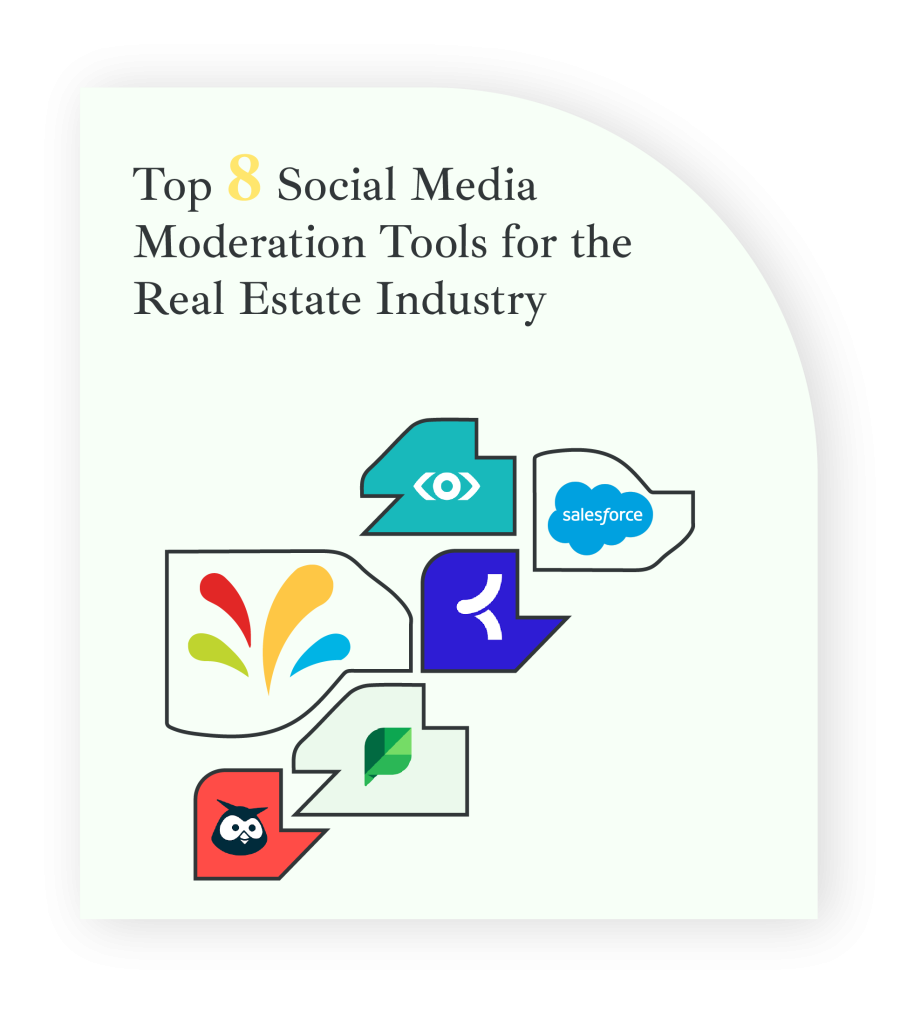
Additionally, Inbox includes useful automation features like private messages and DMs, public messages and posts on your profiles, dark and organic comments, mentions, emoji reactions, and many others.
- The all-in-one dashboard allows you to:
- Track the interaction history of any given person through your social media accounts so that you have the context to personalize responses.
- Add notes to the customer profile for later reference.
- Team message management, tasks, message queues, and status filters make workflow smoother, especially for larger brokerages.
- Response times are under the control of monitoring and CSAT metrics tracking.
Putting the customer at the very center of your service will make you have stronger and more loyal relationships with your audience.
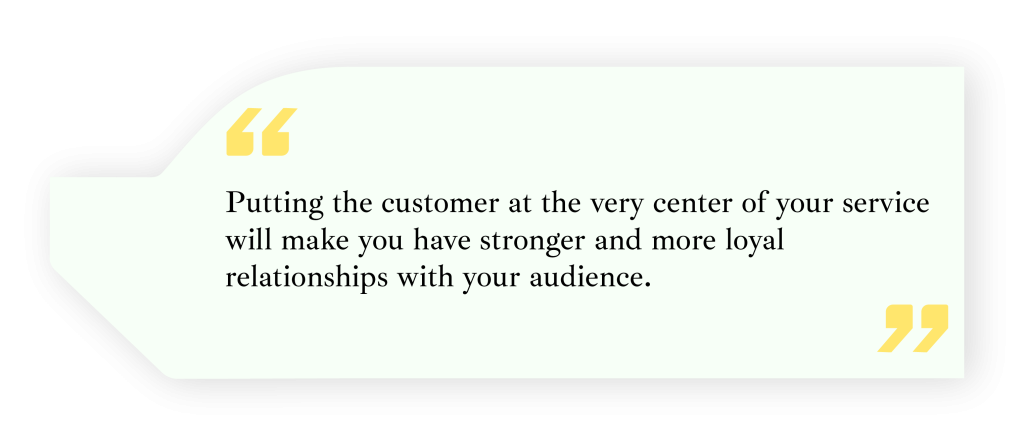
8. Educate and Inspire
Buying into a mortgage, choosing a neighborhood, or selling any home can become a daunting task if they are not completely versed in what takes place.
Agents and brokers should utilize social media to make real estate easy and build relationships through the sharing of useful information. Discuss market trends, and tips on how to get ready to buy or sell, and inspire them on how to make their homes more beautiful and functional.
In return, you’re gaining their trust as the potential clients inch closer to their goal of buying or selling real estate.
9. Paid Advertising
The most important advantage of social media for real estate marketing is that it allows increasing your reach with paid advertising. Targeted investments get your content in front of more people and ensure you are talking to the right crowd.
Place, age, demographics, interests-these are just a few of the parameters one can use to set, and ensure that the right people are looking at your posts.
For more details about this topic, check out the comprehensive part about it in section number 6: Master Paid Social Media in Real Estate.
10. Build a Community
Though followers may come to your page for real estate information, they stay for a sense of community. Your social media can be a place where people explore new cities, learn about specific markets, or find and connect with others like themselves.
Construct your real estate and social media plans in a way that nurtures a long-term relationship with your network. You never know which connection might be your next mega client.
And now, just as you know what you should do and apply in terms of real estate marketing, you should also know what you shouldn’t do and avoid, for a great online presence.
5 real estate marketing mistakes that agents should avoid
1. Over-Promoting Your Home Listings
It’s okay to promote the homes you have for sale. But your listings really shouldn’t dominate the conversation. Create valuable content – answers to common questions from buyers and sellers. They’ll be back for more.
2. Neglecting Video
With more than 8 billion video views taking place on Facebook every day to say anything about skipping over video content is a missed opportunity.
Videos are crucial in helping to create an emotional connection with your would-be buyers, and this is all the more important in real estate, where visuals quite literally are everything. A good video can show a property in ways that a photo can’t, ultimately enhancing the buying experience.
Also, putting your videos on YouTube and other sites will enhance the SEO of your website to place it higher in search engine results, like Google, usually the first place a homebuyer begins the search.
3. Assuming You’re Only Reaching First-Time Buyers
As per the National Association of Realtors, only about 22% of home buyers are first-timers, and use social media as an avenue for connecting with customers, but not all of them are newbies when it comes to the process.
Make sure to gear your content toward both first-time homebuyers and seasoned ones. This will create a wide net to capture audiences from different demographics who can relate to your advice and insight into first-, second-, and third-time experiences.
4. Talking to an Empty Audience
Have you ever posted an image or video that you thought was perfect, but got no engagement at all? While it may have seemed interesting or aesthetically appealing to you, it simply might not have had the same effect on your audience. Social media should be more about listening than broadcasting. Pay attention to how the audience is responding and reacting to the different types of content you post.
Use informal polls or survey tools like Survey Monkey or Google Forms to gather insight. This will help you connecting with your audience by coming up with relevant content.
5. Neglecting Your Current Clients
And don’t forget to add past buyers and sellers to your social media network. By inviting them to connect with you online, you will be building an online community rich in shared experiences with great tips from others who have recently gone through buying or selling.
Let’s now discuss and compare difference and proven effectiveness of online marketing platforms that proved success withing the real estate marketing.
Which platforms are the best for your real estate online presence?
Realtors can utilize several social media platforms to reach potential clients and effectively showcase their listings. Following is a breakdown of some popular platforms and how they could be useful in real estate marketing:
With over 2.9 billion active users on Facebook, it works perfectly for offering listings, posting local market updates, and communicating with potential clients. Its wide user base lends itself well to diverse uses, from targeting small to large-scale audiences.
Instagram is designed to engage visually, so this platform works well for visually showcasing properties in high-resolution photos and videos. It’s also an extremely solid platform for brand development and engaging prospective clients with stunning visuals.
A professional networking site, the use of LinkedIn proves quite helpful in connecting with other professionals in the real estate business, besides sharing news and insights in the industry. It helps you establish credibility and network within the real estate community.
TikTok
Known for its short, catchy videos, TikTok can also be employed by real estate agents when showing properties and connecting with a younger generation of buyers. It might not be suitable for every real estate marketing strategy.
It allows users to learn about and visually save ideas, making it great in terms of showcasing properties, interior design tips, and education overall. It helps in engaging possible clients through stunning and very informative visuals.
YouTube
YouTube was the first video-sharing platform and has enormous potential for real estate agents to upload a videos of properties, virtual tours, and a lot more. This is one strong channel through which you reach out to prospective customers to expand your online presence.
X
One can follow the trend within an industry on Twitter, entertain potential clients, and advertise properties. This is a very good platform for updates and communicating since it is live and quick.
Of course, it goes without saying that whatever social media tends to be most effective for a realtor depends on his target audience and marketing objectives. It is very important to pick the channels most appropriate to your business goals and then invest in those channels.
The above mentioned platforms will not be complete without an understanding of how to run successful sponsored campaigns, keep on reading to find out.
Master the Balance Between Paid and Organic Social Media in Real Estate
The paid media allows a reach that is targeted and beyond the reach of organic alone. Here’s how to harness this power effectively in the real estate market.
Choosing the Right Platforms
The proper selection of platforms is very important. Assess each of these according to your business needs to find which one works best for you. Consider such things as demographics, platform features, and the type of content you want to distribute. This analysis will help you choose the platforms that offer the best opportunities to reach your target audience and achieve your marketing objectives.
Did you know? According to Facebook Business, targeted Facebook ad campaigns for real estate can increase lead generation by as much as 50% when compared to traditional methods of advertising.
The Power of Organic Social Media
While paid social can extend your reach, organic social media is still the heartbeat of your online presence. This is where you build relationships, establish your brand, and engage with your community on a personal level.
Organic social media creates authentic conversations and longstanding engagement with your audience. It is just the perfect complement to paid advertising, which gives you targeted reach for a well-rounded social media strategy.
Create Engaging Content
When you want to perform well organically, then you should create content that adds value to the audience.
Share some tips on home maintenance, market trends, or even behind-the-scenes views of your day-to-day operations. You can consider educating, entertaining, and therefore engaging with your audience.
Paid vs. Organic: A Mutual Relationship
A completely paid or a completely organic approach is like trying to walk with one shoe on: you’ll be moving, but not very effectively.
A perfect strategy is a balanced strategy that marries the targeted reach of paid advertising with the authenticity and engagement of organic content. Paid drives visibility and desired actions, such as attending open houses or subscribing to your newsletter. Organic efforts nurture relationships and help in turning leads into loyal clients.
Measuring Success
Success is an artful blend of strategies. Track the quantitative results of the paid campaigns, such as click-through rates and conversions, but also the qualitative successes of organic engagement, like community growth and interaction, to find the perfect mix for your real estate brand. Indeed, diction, being the style of a writer concerning vocabulary, phrasing, tone, and syntax among others, is essentially about being personal.
1. Click-Through Rate (CTR):
The number of people who click on your ad after seeing it; it is a percentage reflecting whether your ad is catching the interest of people.
2. Cost Per Click (CPC):
This is the dollar amount you are spending for each click on your ad. CPC is usually higher when you are focused on more competitive keywords. It is one of the most important metrics to predict the number of clicks you will get with your ad budget.
3. Conversion Rate:
Conversion rate determines the percentage of people who have completed the conversion action on your ad. For example: if you set up your conversion to be a form submission, then the conversion rate is the number of people who submitted the form divided by the total number of people who viewed your ad.
The good news is, you don’t have to handle everything on your own. Hiring a specialized virtual assistant can take the hard work out of real estate marketing, executing tasks efficiently and effectively.
Rise of Virtual Assistants: Transforming Real Estate Marketing
In today’s fast-moving world of property buying and selling, it is not anymore just about closing deals. It’s about effective marketing, seamless organization, and a solid online presence that eventually leads to closed deals. Over the past years, the Real Estate Virtual Assistant proved to be an ultimate edge to change the way every real estate professional operates and promotes their services.
Here’s how a virtual assistant for real estate marketing can usually supports your business:
Optimizing Marketing Efforts
A Virtual Personal Assistant for Real Estate takes care of innumerable marketing tasks from designing and proofreading promotional materials for either digital or face-to-face efforts to compelling content creation that attracts buyers.
They make sure your listings are ready to hit the market. myVPA ensures having experienced virtual assistants on board which guarantees optimum marketing results for your real estate business. Visit the services offered by a marketing virtual assistant presented by myVPA from here.
Efficiently Managing Social Media
Managing all social media-related activities is overwhelming, but that job becomes easy with a VPA. They organize and maintain your social presence in one easy-to-use dashboard, visually create engaging content, and schedule posts weeks ahead of time. A virtual assistant can even report performance with in-depth analytics to help you understand what’s working and what areas need improvement.
Focus on Engagement and Growth
A Virtual Personal Assistant is responsible for empowering your social presence by making sure all followers are engaged, commenting back, and messaging them. This will help building a community of interaction around your brand. They strategically grow an organic following with planning on successful social media hashtag usage, collaborating, and tactics geared to increase engagement.
Business Operations Support
Beyond marketing, VPAs will assist in general tasks such as writing and sending emails, newsletters, and promotional materials. They also carry out administrative tasks for online stores, including the precision of the descriptions of a certain product, updating the inventory, and updating orders.
Leveraging Multi-Channel Strategies
VPAs implement multi-channel ad campaigns and content marketing strategies to drive business growth. They’ll keep you organized with CRM systems and customized forms, enhance visibility with reputation management, and round out the transactional process with eCommerce coupled with flexible payment solutions.
In a nutshell, Virtual Assistants are taking the real estate market to a whole new level. They are indispensable in marketing, managing social media, and running the business. Free yourself up to do what you do best—serve your clients—and let a VPA handle the rest. You can hire your marketing VA from the available ones on myVPA website from here.
And if you are not sure yet if your business is really in need of a real estate marketing virtual assistant we prepared you a list that might help you decide.
When Should You Consider Hiring a Marketing Virtual Assistant for Your Real Estate Business?
Time is, of course, your most treasured asset. Much of the activities surrounding real estate are time-sensitive; hence, beating the competition largely depends on how well one manages their time.
Real estate agents are always on their toes, serving clients to enable both buyers and sellers to achieve their objectives in the shortest time possible. The nature of such interactions is usually intensive. For this reason, their administrative support is always welcome.
This is where virtual real estate assistant services can make a whole lot of difference. Training and hiring a virtual real estate assistant to prepare your systems and operations for greater efficiencies will do a whole lot of wonder for your business. In this blog, my VPA discusses many benefits derived from integrating virtual assistants into your real estate business.
If you find yourself in a situation where you need help with three or more of the following tasks below, then you should probably consider hiring a Virtual Assistant today.
1. Be Ahead of the Game
The bottom line in the competitive real estate market is that one must always try to be one step ahead of the game. A virtual assistant will help in processing redundant administrative work, like organizing the inbox and updating schedules. In this way, you can free up time to pay more attention to strategic activities and client interaction, increase the level of professionalism, and most importantly, improve the overall experience of your clients.
2. Increased Sales and Concentration
These virtual assistants, while working for a real estate firm, are bound to increase your sales by automating those stressful activities that take the greater portion of your time. This will help you to focus on high-leverage activities such as generating leads and closing deals that see your business thriving, enabling it also to grow its reputation and referral rate.
3. Cost-Effective Solution
It saves money since the hiring of a VA is cheaper compared to conventional employees. They work remotely, meaning no cost is incurred in providing a space for their equipment. They come with flexible terms of payment and competitive rates that enable you to save on taxes and insurance by improving positive cash flow.
4. Flexible Working Hours
Virtual assistants give the flexibility of working beyond traditional office hours. This simply means you can urgently address particular tasks and client needs, thereby becoming more responsive to clients with much ease while improving work-life balance.
5. Increased Productivity
They reduce burnout and keep the energy level high by automating tasks that take too much time. All this opens up more time for creating more and more transactions and interacting with clients for increased success in the real estate market.
6. Access to Diverse Skills
They can provide a wide range of skills, from marketing and administrative support to customer care. These extensive arrays of tasks that one can assign to them mean that you get to manage more aspects of your business without necessarily needing to hire other types of specialists, too.
7. Efficient CRM Management
Because the VA manages CRM efficiently, they keep your CRM system updated for the records of accuracy in customers’ interactions and leads. It helps a great deal in relationship management while automating tasks like email follow-ups and appointment reminders.
8. Detailed Market Research
Enabling market research is highly critical to survival and competitiveness in the market. However, these might be really time-consuming. A dedicated Virtual Assistant may do some preliminary research and discover market insights for you and keep track of competitor activities. You will be furnished with valuable insights that help in building your business.
9. Listing Maintenance
Listings need to be rightly maintained and updated consistently. A virtual assistant may provide services in listing creation and ensures detail accuracy. Virtual assistants assist in verifying documents for smooth processing.
10. Improved Social Media Marketing
A virtual assistant will be able to manage your social media, develop engaging content, and engage your target audience across several platforms. Therefore consistent branding will work to build brand awareness, which will eventually attract potential clients. In addition, a virtual assistant will keep an eye on analytics and trends.
11. Improved Mental Health
With a VA taking some of the workload off your hands, that would reduce the stress and hence prevent burnout. It also gives you time to focus on personal commitments and self-care to bring about a more balanced work-life situation, thus improving overall well-being.
Conclusion
In today’s competitive real estate market, the use of social media to one’s advantage should be pursued thoughtfully, with great consideration for how it serves to enhance one’s marketing efforts. Avoid classic pitfalls-just over-advertising listings and foreshadowing the absence of video in your content-or build vibrant visuals, appealing to the various needs of your target audience, in order to enhance your online presence.
Of course, virtual assistants will help you smoothen operations all the way from tedious tasks to strategizing your marketing effort. In that manner, they help you free your time for higher-value activities and, in turn, serve your clients better.
By coupling these innovative social media tactics with the skills of a virtual assistant, you will always stay one step ahead, grow closer to your clients, and have more success in real estate. myVPA offers you all the virtual assistant features you may need to reach your goals and maximize your online presence. Get in touch today to find out more about what we can do for you.

